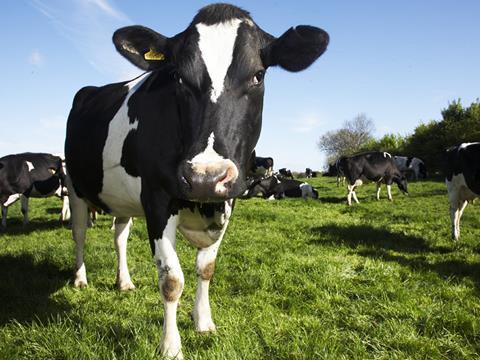IGD CEO Sarah Bradbury’s role as co-secretariat to the Food Strategy Advisory Board has caused a stink. How can she get industry behind her?
Last month the government made the first steps towards defining a food strategy for England. Among other diverse issues it aims to create a “healthier, more affordable, sustainable and resilient food system.
But before it has even drawn up any policies, behind the scenes an almighty row has been brewing over the IGD’s elevated role in steering Labour’s flagship strategy.
So what’s going on? And how can it be resolved?
Industry representation
The first signs of disquiet emerged when Defra unveiled a list of powerful industry leaders, NGOs, academics and government officials in March to form the Food Strategy Advisory Board (FSAB).
And fears were expressed straight away that the board was heavily populated with strong critics of the industry’s role in the obesity crisis, including CMO Chris Whitty, FSA boss Professor Susan Jebb and the influential Food Foundation.
Yet ironically it’s the appointment of IGD CEO Sarah Bradbury as a co-secretariat that seems to be the cause of most concern right now.

The former Tesco group quality director has rallied the once ultra-cautious industry body into a more outspoken lobbying voice since her arrival two years ago.
Her role, according to Defra’s brief, is to “support the effective and proper functioning of the FSAB” but also “help co-ordinate government and industry”.
Several senior industry sources close to the strategy decisions have voiced concern, with the IGD’s support for a radical new agenda on health at the forefront.
“Everybody is slightly suspicious that the IGD is pushing its own agenda on health through the food strategy,” a source tells The Grocer.
Another leading figure adds: “There is a concern they’ve crossed the line from information to influence.”
Bradbury strongly defends the IGD’s role and stresses its raison d’être is to “unite and inspire” the industry to tackle major challenges such as health and the environment, making it perfectly suited for the role, which she stresses is “purely advisory”.
Yet since her arrival, IGD has put several noses out of joint.
Moving from information to influence?
Working with Asda, Morrisons, Sainsbury’s and Tesco, to understand the impact of the HFSS legislation restricting location placement of HFSS promotions that was introduced in October 2022. Billed as the first independent peer-reviewed evaluation of the legislation, with data analysed by the University of Leeds and part of the UKRI Transforming UK Food Systems academic collaboration with the University of Aberdeen.
Launched major project involving food businesses across the supply chain “working together, at pace” in response to net zero ambitions with plans for a ‘joined-up’, whole-system view. In November, an update warned consumption of red meat and dairy will need to be cut by at least 20% to meet targets.
Appointed as secretariat to “support the effective and proper functioning” of the Food Strategy Advisory Board with a wider role of “helping co-ordinate government and industry”.
Bradbury’s first big move was to commission research from the University of Leeds on the impact of the former government’s HFSS legislation because, as she put it in an exclusive interview with The Grocer in late 2023 “no one else was doing it”.
Asda, Morrisons, Sainsbury’s and Tesco are all taking part in the major study, part of the wider UKRI Transforming UK Food Systems academic collaboration, led by Professor Alex Johnstone of the Rowett Institute at the University of Aberdeen.
The results, delayed until the autumn, are likely to have major implications for future government policy. Some say it could even lay the foundations for more sweeping regulation of HFSS products.
One source says the fact it was Bradbury’s old employer Tesco that was first to come out in support of mandatory reporting for food companies was no surprise.
However, much more controversial than mandatory reporting – which virtually all major supermarkets now back – are plans for government targets on health, and massive fines for those who don’t hit them, with fears growing that IGD involvement is “supplying the ammunition”.

“One can understand why the government has approached the IGD to carry out this role in the strategy because on the surface it is not affiliated to one sector and it has a track record of collaborative work,” says one industry source.However, with the introduction of mandatory reporting, and a number of other measures including a revamp of the nutrient profiling model – ironically under the NHS 10-Year Plan rather than the food strategy – hopes the IGD would be the perfect body to maintain harmony were “wishful thinking”, adds the source.
“If they are going to toughen up the nutrient profile model there are potentially tens of thousands of products that are going to be branded as HFSS. “This is the culmination of years and years of government, just like the previous food strategy by Henry Dimbleby, focusing on the food industry as a negative force, the cause of the obesity crisis, rather than adopting a positive nutrient-based policy that focuses on the good stuff the industry is doing and can do more of.
“It’s not just the presence of IGD in the tent that’s causing angst,” the source adds. “There’s also quite a strong influence and role played by the Food Foundation.
“They have achieved a lot of great things, for example on the expansion of school meals and work on food poverty, but many of the policies they espouse are draconian and are also pretty anti-animal based foods. “To have them perform such an advisory role is worrying and it does seem there has been some cross-fertilisation between them and the IGD.”
Net Zero Transition Plan
In November, IGD, along with Wrap and accountancy giant EY, published a document titled A Net Zero Transition Plan for the UK Food System, which warned consumption of red meat and dairy would need to be cut by at least 20% to meet government net zero targets.
The report called on the industry to make huge changes to production. But The Grocer understands it has faced furious pushback from farmers and own-label suppliers.

“That report really snapped my head back,” says the source. “What they are proposing is a real threat to their business models.”
“Clearly there is history there with IGD and farming groups because of its work on net zero,” adds another source.
“Whilst the food strategy so far has been very vague on this, it’s going to be a major area of contention.”
Others take a different view. “With regards to the IGD’s net zero report, I don’t think it was particularly anti-meat, nothing like as strong anyway as Dimbleby’s original food strategy. I think it was quite middle of the road.”
Missing growth agenda
Among the 10 goals set out in the initial Food Strategy plans were pledges to ensure a supply chain that is “environmentally sustainable”, with “high animal welfare standards” and one that “supports environmentally sustainable growth”.
But while the IGD has a long track record of work to try to improve skills and employment in the industry, some object to it adding its voice to key strategic decisions that they argue could result in lost jobs and believe much more focus should be put on growth.
In her 2023 interview with The Grocer, Bradbury made no apologies for wanting the IGD to be more active on the big issues.
“There is an opportunity to have a louder voice,” she said. “Many people have asked can you lobby, and will you lobby. For me the history of the IGD is around science and evidence and that’s what I want us still to be,” she said. “But does that mean we can’t have a point of view? No. As long as it’s an independent point of view, for society’s benefit, that’s absolutely fine.”And 18 months on Bradbury’s position hasn’t changed. “We believe strong collaboration between industry, government, and civil society is essential to building a thriving food system that is more sustainable, healthier, and resilient for everyone.

It’s clear that the industry must work more closely together, and that everyone has a part to play.”
Many of the key players in the food strategy will be speaking at the IGD’s conference in October, itself a source of controversy, with some sources saying it is inappropriate for it to be charging £500 a head.
“Again, it begs the question what’s the IGD’s role in this,” says one. “Is it partly to raise finances for the IGD and do you need to be a member of the IGD or somebody with deep pockets to be involved in the future of the food strategy?”
However, government sources dismiss criticism as “sour grapes” and strongly defend the IGD, insisting Bradbury’s presence means the food strategy, despite its critics, is “light years ahead” of where it would be otherwise.
“A good secretariat was always going to be influential,” says a source. “Most of the people who’ve been unhappy have been from traditional trade associations [who do not have a seat at the FSAB table].

“The issue is the IGD is the one group who are multi-sectorial. None of the other groups could have carried out that role.In fact, the industry is lucky to have the IGD in that role where it can be trusted.
“The alternative is a traditional civil service-run secretariat and we would not have had an ounce of the progress we’ve actually made. I know which I’d rather have.”
King Canute
Rather than resisting moves towards health targets, the industry needs to engage with the debate and help shape them, the source adds.
“The gates had already lifted on mandatory reporting. Nobody swum against that tide. Even the FDF which was as solidly opposed as anyone on that has gone through 180 degrees and come out in favour of it. Once you open the gates on mandatory reporting then the issue of targets is inevitably going to come up. “I would say to the industry you’d be much better deciding what those targets might be and influence that rather than trying to do a King Canute and stand in the way of it.”
Come September, when talks on the detail of the strategy begin again in earnest, let’s hope talk can move on from who is running the food strategy to what it will achieve, and how.




















No comments yet